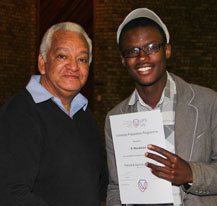Latest News Archive
Please select Category, Year, and then Month to display items
12 October 2020
|
Story Arina Engelbrecht
|
Photo Supplied
 Arina Engelbrecht from Organisational Development and Employee Well-being believes physical activity has a number of benefits for one’s health, including stress relief.
Arina Engelbrecht from Organisational Development and Employee Well-being believes physical activity has a number of benefits for one’s health, including stress relief.
Being physically active plays a big role in preventing the development of mental-health problems and in improving the quality of life of people experiencing mental-health problems.
Treatment for depression
Physical activity can be an alternative treatment for depression. It can be used as a stand-alone treatment or in combination with medication and/or psychological therapy. It promotes all kinds of changes in the brain, including neural growth, reduced inflammation, and new activity patterns are formed that promote feelings of calm and well-being. It releases endorphins – powerful chemicals in the brain that energise your spirit and make you feel good.
Physical activity can be very effective in relieving stress. Research in adults has found that physically active individuals tend to have lower stress levels compared to individuals who are less active. It also leads to improved sleep. When a person sleeps better and feels more rested, overall quality of life improves. They cope better with daily life stressors.
Reduce Alzheimer's risk
Regular physical activity can reduce your risk of developing Alzheimer's disease by up to 50%. It can also slow down further deterioration in those who have already started to develop cognitive problems. It stimulates the brain’s ability to maintain old connections as well as to make new ones.
A study asked people to rate their mood immediately after periods of physical activity (e.g. going for a walk/run, cycling, doing housework) and periods of inactivity (e.g. reading a book or watching television). Researchers found that participants felt more content, more awake, and calmer after being physically active compared to after periods of inactivity.
In conclusion, people who are physically active feel a sense of well-being, feel more energetic throughout the day, sleep better at night, have sharper memories, and feel more relaxed and positive about themselves and their lives.
“Being physically active not only changes your body, it changes your mind,
attitude, and your mood.” – Arina Engelbrecht
Mid-year prize-giving ceremony for UPP and Extended Programme students
2012-09-20
 |
Prof. Neil Heideman, Dean of the Faculty of Natural and Agricultural Sciences, with top achiever Buyisani Masabalala.
20 September 2012 |
With a subject percentage of 94% in Chemistry and 89% in Mathematics, Buyisani Masabalala is at the top of his class. The student, who is part of the University Preparation Programme (UPP) offered on the South Campus of the University of the Free State, was named top student in the Natural Sciences for students in the programme.
Buyisani and 28 other students on the UPP and Extended Degree programme, received certificates at a prize-giving ceremony held on the South Campus. They were top performers during their first six months in all subjects on the UPP and Extended Degree programme. The UPP is a one-year bridging programme for students who do not meet the initial admission requirements for mainstream studies at a university. The extended degree programme caters for students who do meet mainstream university admission requirements but have a lower admission score.
With their excellent results, Buyisani and the other top achievers are now one step away from entrance into mainstream studies. They are now awaiting their final results that will be out at the end of the year. As an incentive to study even harder, the UPP top achievers in the Faculties of Humanities, Economic and Management Sciences, Natural and Agricultural Sciences and Agricultural Sciences and Education will each receive a bursary at the end of the year. The same applies for top achievers in the B Com and BSc Extended Programme and the Vocational Directed Preparation Programme top achievers.